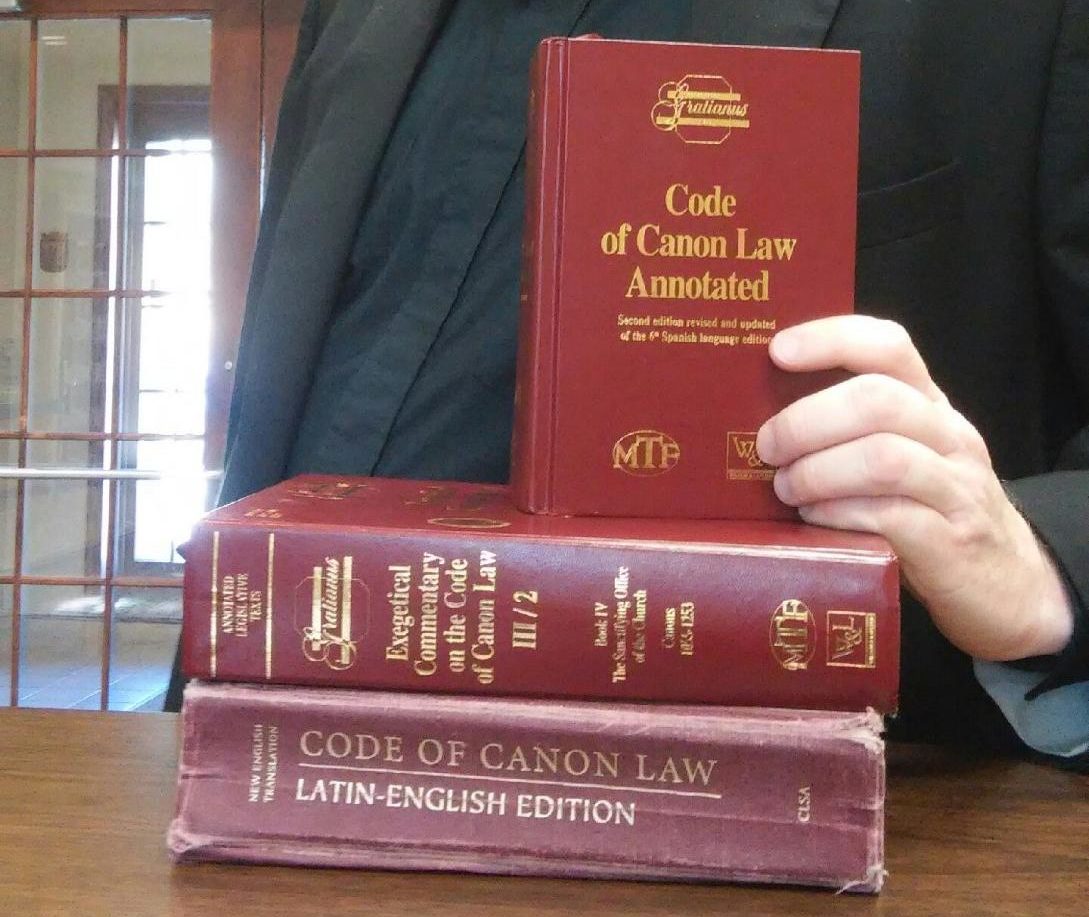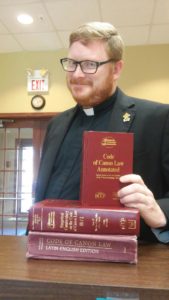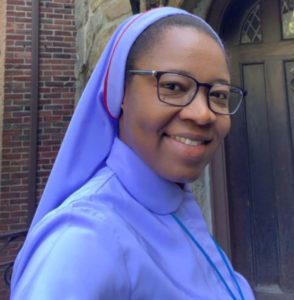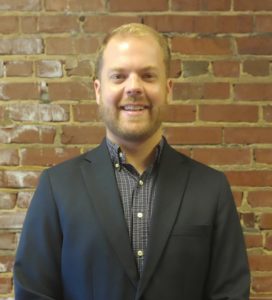New ministry based in Chattanooga to handle annulment requests, other canon law cases
By Bill Brewer
The Diocese of Knoxville now has a fully functioning tribunal, a canon law ministry that will decide annulment cases and other legal matters that are within the specific purview of the Catholic Church and the diocese.
Bishop Richard F. Stika and Father David Carter, a canon lawyer and pastor of the Basilica of Sts. Peter and Paul Parish in Chattanooga, have led the effort to establish a tribunal dedicated to the Diocese of Knoxville.
Bishop Stika said in 2016 that Knoxville was rare among Catholic dioceses because it did not have its own panel of judges and support staff to rule on requests for declarations of nullity of marriages and other canon law issues unique to the diocese.
Tribunals handle a variety of canonical cases within the Church, but requests for declarations of nullity make up the majority of tribunal cases. The Diocese of Knoxville has paid a fee to the Diocese of Nashville for handling the East Tennessee cases since 1988.
“This is a much-needed step for our diocese. The tribunal was the last vestige that connected us to the Diocese of Nashville. I am grateful for their help over the years. That assistance was necessary at first, but we have grown enough that I am happy to say that we can now fulfill our canonical obligation to provide a tribunal on our own,” Bishop Stika said. “It has been a priority of mine for a long time to see that we can better serve the faithful in this diocese without the need to entangle ourselves in the extra logistics and expense of doing everything out of Nashville. This is a good and, quite frankly, necessary move for us.”
Effective June 1, Bishop Stika appointed Father Carter judicial vicar of the Diocesan Tribunal of Knoxville. Father Carter is one of three judges on the panel that will decide tribunal cases. The other judges are Sister Catherine Ngozi Okoye, SJGS, and Tyler Ross, both of whom are canon lawyers, too. The three judges will be based in Chattanooga.
Joining them on the tribunal staff are canon lawyer Janette Buchanan, who will serve the tribunal as defender of the bond and promoter of justice, and tribunal moderator Jenny Morris, who will act as a notary and will also ensure that tribunal acts are properly drawn up and issued, based on the mandate of the judges, and are preserved in the archive according to canon law.
Father Carter has been preparing for a ministry such as this since earning his canon law degree in 2010 from the Pontifical Gregorian University in Rome.
“Bishop Stika announced this in 2016, so it’s taken us four years. The bishop, by rite, can establish his tribunal. He must get official permission from the Supreme Tribunal of the Apostolic Signatura, which functions as the justice department of the Catholic Church,” Father Carter said. “We received our competency to receive and adjudicate cases on July 1.”
Father Bede Aboh, a priest in the diocese who serves as chaplain for the Catholic Center at East Tennessee State University in Johnson City, is currently studying for his canon law degree and will join the tribunal staff once he completes his degree requirements next year.
Father Carter explained that Mr. Ross, Sister Catherine, and Ms. Morris are full-time employees of the diocese who will live and work in Chattanooga. Ms. Buchanan is working out of the Diocese of Nashville as a contract employee. The two priests will include their tribunal work as part of their current priestly responsibilities.
Father Carter, in addition to Bishop Stika, is grateful to the Diocese of Nashville for handling the East Tennessee cases for the past 32 years and for assisting in the creation of the new Diocesan Tribunal of Knoxville.
Father Carter has spent the past two years serving on the Diocese of Nashville’s tribunal as the adjutant judicial vicar as part of the process of transitioning to the new East Tennessee tribunal.
“The Diocese of Nashville has graciously offered to let the Diocese of Knoxville continue to use the Diocese of Nashville tribunal. I was one of the judges for cases that came from the Knoxville territory,” Father Carter said. “Justice is supposed to be local as much as possible. Some dioceses don’t have the resources to make that a reality. We now have our tribunal in house.”
Father Carter explained that each tribunal case will be heard by the three judges. He noted that the tribunal can hear any case the code of canon law entrusts to a tribunal, including the violation of laws of the Church involving priests.
In annulment cases, each person filing for a declaration of nullity is assigned a case sponsor who will assist the parties through the process.
“The case sponsor’s role is one of accompaniment to help navigate the process of making a petition. They are like paralegals that assist in handling paperwork and are trained by the tribunal to be familiar with procedures and necessary elements to make a successful petition,” Father Carter said.
He further explained that depositions in cases can be taken at the tribunal offices in Chattanooga or with tribunal auditors in Knoxville and the Tri-Cities.
“The parties will appear before tribunal personnel but not necessarily in Chattanooga. We are experimenting with computer meetings but that is complicated because of legal requirements,” Father Carter said, emphasizing that the tribunal wants to be as
accommodating as possible to those involved in petitions.
He also emphasized that petitions for declarations of nullity can be emotionally charged, and judgments in those cases can trigger strong responses.
“We try to be as pastoral as possible. We are a pastoral tribunal; we lead people to the truth that will set them free, but the reality is that truth can be difficult to accept or is something that someone does not want to hear,” Father Carter said. “But we try to convey the truth with compassion and evangelical zeal for the salvation of souls. Just like a good shepherd leads the sheep to green pastures, so, too, we are charged with leading souls to live in the truth of God’s will for their life, even if it means carrying the cross of marriage vows that continue to be valid.”
To prepare for this new role in addition to pastoring the basilica, Father Carter was granted a sabbatical by Bishop Stika and spent the first two months of 2020 in the contemplative Monastery of Christ in the Desert in New Mexico, where he was in silence and solitude.
“I was fortified in the spiritual life,” he said.
Sister Catherine is joining the tribunal staff in Chattanooga from Rome, where she has been serving the Catholic Church in the Sisters of Jesus the Good Shepherd.
She received her Licentiate in Canon Law degree from the Salesian Pontifical University in Rome, her Ecclesiastical Jurisprudence degree from Pontifical Urban University in Rome, and her doctorate in canon law from the Pontifical Lateran University in Rome. She recently completed an internship with a tribunal for marriage nullity cases in the Diocese of Rome.
Sister Catherine said her natural quest for justice and truth in matters of life, as well as her choice of studies and academic qualifications, gave her hope that she would work in an ecclesiastical tribunal as a minister of justice and truth.
“My goals for the tribunal are that the judiciary power of the tribunal always be exercised in line with the established laws of the Church and the civil law where applicable; that those faithful who seek justice and truth not be disappointed by the tribunal services,” Sister Catherine said. “Tribunal ministry demands team spirit and simplicity for optimal and exemplary performance. It is my earnest prayer that this team spirit be always alive among the ministers of the tribunal. That through the intercession of our Blessed Mother, Virgin Mary, the undoer of knots, all who may seek assistance of the tribunal in their marriage cases may always find fulfilment with joy.”
Like Father Carter, Sister Catherine, 42, acknowledges that hearing marriage nullity cases can be emotionally trying.
“However, a true judge is not to identify emotionally with any party in the case. The judge is a party to the truth and justice, not the emotional stories of the plaintiff or respondent. As long as I choose to be impartial, being a party to no one, I will hold back the floods of emotions with the dyke of justice and truth,” she said.
“God is the supreme Judge. He entrusted all power to His Son, Jesus Christ, who through Him, according to the dogmatic constitution Lumen gentium, the bishops, as vicars and legates of Christ, are invested with the judicial power for judging the subjects entrusted to their care. By virtue of their episcopal office, bishops possess proper, ordinary, and immediate judicial power, which they exercise personally in the name of Christ, though with some degree of supervision of the supreme authority of the Church,” she noted, adding, “the bishops do not always exercise personally the judicial power which is a part of the power of governance. They ordinarily appoint competent clerics, religious, and lay faithful as ecclesiastical judges authorized to assist him and exercise the unreserved judicial power of governance of the bishops.”
“The appointed ecclesiastical judges, by virtue of the vicarious office they enjoy, exercise the judicial ordinary power of governance with a vicarious power, iuxta legem, either individually or collegially in a stable, ecclesiastical tribunal. Through the exercise of the judicial power of governance, designated judges cooperate in the judicial ministry of the Church, whose pastoral character is made manifest in the ultimate goal: the salvation of souls,” Sister Catherine concluded. “In judging cases, therefore, I ensure that to follow the principles and tenets established by the Church for marriage nullity cases. This will not only assist me to judge fairly such a spiritual matter but also to save my soul.”
This will not be the first time Sister Catherine has had the privilege of being part of a new ministry, but she feels East Tennessee is where God is leading her now.
“I am excited and happy to be part of this new ministry in the Diocese of Knoxville. It is indeed my privilege,” she said.
Mr. Ross’ journey to a judicial appointment on the tribunal has been a shorter distance geographically, but more of a longer route academically and spiritually.
He was born and raised in Chattanooga, attending St. Jude Church and St. Jude School as a youth before graduating from Notre Dame High School. He then attended Tennessee Tech, majoring in biology with an eye toward a career in genetics.
But God started tugging at Mr. Ross’ heart, leading him to do a 180-degree shift academically. He transferred to Aquinas College in Nashville, where he changed his field of study to theology and philosophy.
After earning degrees in theology and philosophy, Mr. Ross attended for two years The Catholic University of America in Washington, D.C., where he received his Licentiate in Canon Law degree.
“I did the transfer totally on faith,” Mr. Ross said. “Transferring to Aquinas College was a leap of faith.”
And what’s more, he had no idea what path his faith/vocation journey would take going into his senior year of college. But a long-term relationship with Father Carter helped Mr. Ross define his path. Mr. Ross, 26, has known Father Carter since he was in the sixth grade at St. Jude. The diocesan priest has been a mentor to Mr. Ross, who said he spoke at length about his faith journey to Father Carter as he approached college graduation. It was then that Father Carter mentioned the new tribunal that was being established and suggested a canon law degree as a possibility.
“I said, ‘OK, God, if this is the door you’re opening, then this is the door I’ll take,’” Mr. Ross recalled. “I’m a product of Catholic schools in the Diocese of Knoxville. The diocese has formed me and given me my faith. So I am happy to give back in some way.”
Mr. Ross understands how unique it is to start a tribunal. He said the only person in his canon law class who was going to be involved in starting a tribunal was from Papua, New Guinea. That process ranges from how is the tribunal staff going to help people and assembling a tribunal staff to what the tribunal letterhead will look like.
“Bishop Stika has been very supportive, which I’m very thankful for,” Mr. Ross said. “And the Nashville tribunal has been immensely helpful.”
Mr. Ross, like Sister Catherine, will follow Father Carter’s lead in striking a balance between being pastoral and sensitive and upholding the Church’s teaching on marriage. He acknowledged the potential to find cases emotional, but he’s adamant that a tribunal judge must be impartial and pastoral as well as personable and compassionate.
“It takes a particular kind of person to do this. You feel sympathy for people, but you can’t forsake the laws of God. I hope God will give me the grace to see these cases impartially. It’s a very delicate balance. God, in His providence, has placed me in this position. The gift of faith helps you value what God has revealed,” Mr. Ross said.
As the tribunal sets its course of action with a new staff and new cases, the judges are looking at ways this new ministry can best serve the diocese, including possibly working with the diocesan Office of Marriage Preparation and Enrichment.
“We want to be a very pastoral tribunal, focused on the well-being of the faithful who are in need. And we want to provide spiritual resources. We want to view this as a ministry in the care of souls rather than a job that’s just concerned about a process,” Mr. Ross said. “We don’t want to be a barrier to faith. We want to be Jesus for people and promote the Church’s understanding of marriage. We pray it’s a healing process that they can learn from.”






Comments 1
We are so blessed to have a tribunal in East Tennessee. I am praying for you and all who seek the truth of God through the process. I thank each of you serving the Truth and our brothers and sisters in this capacity, especially Bishop Stika. Prayers and Blessings,
Lisa Healy